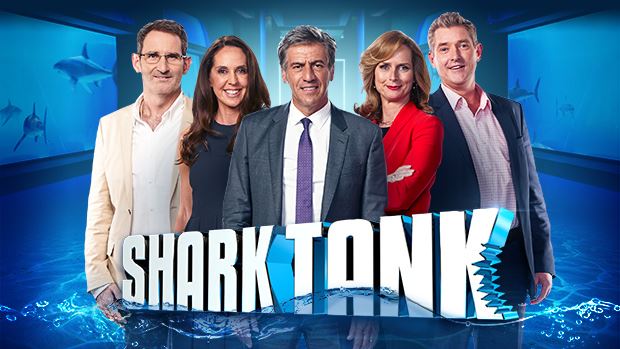Comment from Peter Saxon.
A few weeks ago I logged on to the newly revamped online version of The Sydney Morning Herald.
The very first and most notable of the major changes that were meant to enhance ‘reader experience’ was a giant ad at the top of the screen just under the masthead. The ad is so big you have to scroll down past it to get to the first of the news headlines on the homepage.
At first blush it was an ad for Channel 10’s Shark Tank inviting readers to click on a link to find out about “The Biggest Deal In Shark Tank History. That Can Make YOU Rich In Just 7 Days! (Seriously).”
It looked absolutely genuine with pics of actual Shark Tank judges such as Glen Richards and Steve Baxter looking suitably amazed at how well this product worked.
“Okay,” I thought, “I’ll bite.” Which meant I clicked to follow the link to the site itself where I found details of an incredible episode of Shark Tank which I, as an occasional viewer, had somehow missed. In it the Shark Tank investor/judges reportedly engaged in a heated bidding war to buy a mere 20% slice of a business called Bitcoin Trader for a whopping $2.5 million. The app they’d developed was so simple, anyone with zero knowledge of technology and/or Bitcoin could use it.
Most importantly, it could make you rich in just days from an initial investment as low as $250. Sounds too good to be true but Boost Juice founder Janine Allis seemed happy to confirm that she’d installed the app to purchase $250 worth of Bitcoin while the show was airing and made $73 profit in just three minutes. WOW! If you can’t trust a successful business owner and TV star that’s married to an ex-SCA Content Director, who can you trust?
Of course, it was all a scam. Give them your $250 or more and you’ll never see your money again. These kinds of scams have been around since 14K skinny-band modems that went “bing bang bong” as they connected (very slowly) to the world wide wait were all the rage.
I personally saw the Shark Tank ad on the SMH site at least twice in 24 hours before it was taken down. It was part of a random rotation of ads, some of dubious origin or for dodgy looking brands such as CBA and AMP, that changed each time the page refreshed.
What makes this different to previous ad campaigns for bogus products is:
a). The scammers have brazenly stolen the images of these celebrities, co-opted their profiles and reputations to fraudulently make out that they endorse this rip-off scheme.
b). To give the scam a further air of credence, they’ve managed to place their ads right under the SMH’s venerable and trusted masthead as well as the mastheads of other Fairfax publications.
A Brisbane Times spokesman told The Australian that the ad was generated by a third party and “was inadvertently served on the site. As soon as it was identified as being illegitimate, it was removed”.
And therein lies the problem: The ads are served up by a third party over which the media outlet has no control.
Could it happen on radio? Theoretically, yes. But I sincerely hope not.
It kind of did happen last week, not on radio, but to a radio (and TV) personality, Eddie McGuire who found himself and U.S. relationships expert Dr Phil plastered all over Facebook promoting a bogus erectile dysfunction pill called TryVexan.
The fabricated story features the Triple M Hot Breakfast co-host saying,“I’ve tried Viagra, I’ve tried Red Ginseng, I’ve tried Cialis. TryVexan blows them all away.
“I am so confident in the product Dr Phil and I have created that I am offering free samples to our viewers,” the fake story reads. “I wouldn’t talk about something on air I don’t believe and haven’t tried myself.”
Of course McGuire never said anything of the sort. What he actually did say, though, was, “Clearly this is defamatory against me and it’s illegal to use someone’s likeness and purport it to be them. I’m gonna sue their arse off.”
Whose arse does he mean?
McGuire later told 9NEWS: “My legal advisers today tell me it’s some company out of Panama via Los Angeles, and somehow it ends up on Facebook without any checking and suddenly it’s out there for public consumption.
“How Facebook can actually publish this in Australia has got me beat.
“The last thing I want anybody to do is to think, because my image is involved in this, that this drug is safe.”
For their part, Facebook has since removed the offending article, while a company spokesperson told B&T, “We do not allow adverts which are misleading or false on Facebook and Eddie should report any adverts that infringe his rights and they will be removed.”
That’s just not good enough! Apart from the fact it often takes an eternity to get offensive material deleted from Facebook even after its been reported, it simply shouldn’t get on there in the first place. It shouldn’t be up to Eddie or, anyone else, to have to monitor Facebook or Twitter to check if anyone has used their name and likeness for nefarious purposes.
It is true that the real culprit is the shady mob out of “Panama via L.A.” who obviously have a pretty good grasp of Australian media and local talent in order to dummy up their ads.
But Facebook and Fairfax along with all the other media outlets that have signed up for these third party ads distributed through programatic platforms which are also part of the chain, must take responsibility for the content they dish up.
Before the advent of programatic technology it was unimaginable that bogus ad campaigns of this kind could have appeared in prime positions on Australia’s top media brands. In general, media knows who their clients are. The sales team interacts face to face with them. Both parties can be reached at a bricks and mortar address and are bound by Australian laws. The furthest degree of separation between a client and commercial media might be a reputable advertising agency or media buyer who ads value to the process.
Radio ads are thoroughly vetted before they go to air. Stations often knock back ads that don’t conform to various local standards including those that don’t suit their format.
Online news outlets which have been struggling to make up some of the revenue lost by their paper and ink versions have been the first to embrace programatic, lured by the promise of incremental revenue from ads that automatically appear on their site without the need for much in the way of resources to facilitate it. What could possibly go wrong? Things rarely work on the cheap. Clearly they need to invest in some kind of oversight to ensure their mastheads aren’t hijacked by scam artists.
If Facebook has the technology to automatically harvest private information form hundreds of millions of its users, surely it could develop technology to intercept false advertising before it appears online.
I know this may sound like a wild and desperate idea and anathema to a tech giant but Facebook could use their massive resources to hire enough real, live people to combat cyber piracy.
 In a wide ranging discussion with SCA Chief Sales Officer, Brian Gallagher (which will be published in parts on radioinfo over coming weeks) he made it clear that radio too will earmark a portion of its inventory to programatic but it might take up to three years before it is implemented. “The technology has got to catch up with the promise,” he says. “But even in three years time, even if we’re very successful on programatic, 95 per cent of our revenue is going to be coming through Broadcast.” In other words programatic will be limited to audio delivered through apps.
In a wide ranging discussion with SCA Chief Sales Officer, Brian Gallagher (which will be published in parts on radioinfo over coming weeks) he made it clear that radio too will earmark a portion of its inventory to programatic but it might take up to three years before it is implemented. “The technology has got to catch up with the promise,” he says. “But even in three years time, even if we’re very successful on programatic, 95 per cent of our revenue is going to be coming through Broadcast.” In other words programatic will be limited to audio delivered through apps.
It is inevitable that in the same manner that technology has disrupted the way people watch TV, listen to music, take photos and communicate with each other, that in the long run, programatic will disrupt the way in which the advertising market operates.
But in this era of fake news we are in danger of the information age becoming the “misinformation age” and ‘our arses being sued off’ if we are not vigilant about exactly what content is served up to our audience.

Peter Saxon



A personality is like a brand for which the personality has a known reputation. Brands have various techniques for monitoring their intellectual property. One technique could well be monitoring Facebook or other social media to find any entity misappropriating the face and reputation of a personality/brand.
To illustrate, there was a company promoting a 'get rich quick scheme' asking people to invest $250 in some investment scheme. The ad featured a homeless person and the slogan was something similar to "....from homeless person to millionaire or Ferrari." Doing a picture google picture search the homeless person happened to be a US voice over artist Ted Williams who was at the time homeless. According to his biography there was no mention of his income being derived by the 'get rich quick scheme'.
Another issue: There are occasions where entities don't have control over advertising. Supermarkets and radio stations. The respective products are 'shop a docket' and the traffic reports. For the 'shop a docket' the entity receives rolls of cash register paper for free because the advertisers pay the 'shop a docket' company for advertising space on the cash register receipts. Similarly there are the traffic reports which radio stations get for free or may be paid by the traffic report provider as it did for one radio network in 2016 and at the same time the traffic report provider would advertise the product for 10 seconds before the end of the traffic report.
I cannot comment on whether the providers of dockets or traffic reports have a protocol or arrangement with supermarkets or radio stations as to the type of products advertised by the 'shop a docket' or traffic report provider. For example would a traffic report sponsored by an aged care facility appeal to listeners in on a radio station targeting youth?
However, the nature of Facebook and other social media involves millions of clicks and the collection and analysis of information from millions of clickers seems to be more automated than the 'shop a docket' or traffic report provider. As a result it would be harder to control the advertising of unsuitable and/or infringing content on the internet. What it means is that if radio stations or even supermarkets rely on a free service in exchange for advertising via the 'free' provider there has to be an agreement on what is suitable for the particular market place.
Thank you,
Anthony from Belfield